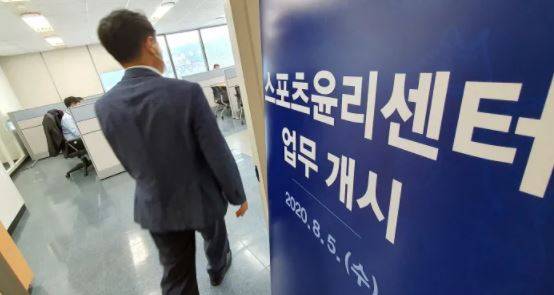"Let's Prevent the Tragedy of Choi Suk-hyeon," Said the Sports Ethics Center. Then Why Did It Dismiss 7 out of 10 Cases?
이 글자크기로 변경됩니다.
(예시) 가장 빠른 뉴스가 있고 다양한 정보, 쌍방향 소통이 숨쉬는 다음뉴스를 만나보세요. 다음뉴스는 국내외 주요이슈와 실시간 속보, 문화생활 및 다양한 분야의 뉴스를 입체적으로 전달하고 있습니다.
[경향신문]

The Sports Ethics Center was established to prevent tragic deaths like that of the late triathlete, Choi Suk-hyeon, who took her own life after suffering from brutal abuse. Yet it turns out that the center dismissed seven out of every ten cases it received. Experts point out that the Sports Ethics Center failed to properly function because the investigators there lacked the capacity.
According to the data that Democratic Party of Korea lawmaker Lim O-kyeong, a member of the parliamentary Culture, Sports and Tourism Committee, received from the Sports Ethics Center on October 30, the center dismissed 108 cases, 68.8% of the total 157 cases it handled from September 2, 2020 when it began operating until the end of August 2021. The center only requested disciplinary actions in 31 cases (19.7%) and requested an investigation on six (3.8%).
The Sports Ethics Center is an independent body under the Ministry of Culture, Sports and Tourism, which was established in August 2020 to investigate and support victims with a focus on human rights infringements and corruption in the sports world. It was launched after the death of Choi Suk-hyeon to prevent similar incidents from happening again. From local sports associations to school athletic clubs, the center handles investigations throughout the sports world.
But it dismissed cases it received at the highest rate among investigative agencies affiliated with the government. The five investigative agencies affiliated with the government (National Human Rights Commission, Anti-Corruption and Civil Rights Commission, May 18 Democratization Movement Truth Commission, Special Investigation Committee on Social Affairs, and the Presidential Truth Commission on Deaths in the Military) dismissed an average of 27.7% of cases compared to those that they handled. The Sports Ethics Center dismissed cases at a higher rate than the Human Rights Commission, where one investigator handled an average of 109 cases a year. The Sports Ethics Commission has seventeen investigators, and last year, they handled an average of 9.2 cases each.
Experts point out that the reason for the high rate of dropped cases is because investigators lack the capacity to handle their tasks. According to an analysis by the lawmaker’s office, only two or 12% of the investigators at the Sports Ethics Center had hands-on experience in investigations at other agencies. The professional experience of the other 88% was in sports administration, corporate management, civic groups, and education administration, which had nothing to do with investigations. Lawmaker Lim said, “Investigations of human rights issues and corruption in sports is a very specialized area, requiring a high degree of expertise in investigations.” She also said, “According to the tips that our office received, there were even incidents where the investigator bought (the victim) drinks and tried to get her to drop the case.”
It was also noted that the Sports Ethics Center hired former police officers as expert investigators, leading to duplicating costs. The expert investigators received an investigation bonus of 250,000 won per case and if they drew up a report on the result of the investigation, they received a bonus of 450,000 won. According to the lawmaker, these investigators were practically overseeing all the investigative tasks. When we add all these costs, so far, the center paid nearly 120 million won in costs incurred by these investigators.
Lawmaker Lim said, “Currently, roles at the Sports Ethics Center is structured in a very bad inverted pyramid shape,” and argued, “It needs to change to one resembling a control tower instead of the inefficient inverted pyramid.” She further pointed out, “To strengthen the capacity of its human resources to conduct investigations, we need to develop a training curriculum to train expert investigators in sports.”
Copyright © 경향신문. 무단전재 및 재배포 금지.
- [단독] 문상호 전 사령관 등 ‘내란 연루’ 군 관계자, 국방부 상대 행정소송 제기
- 선거가 문제가 아니다?···기로에 선 국민의힘, ‘폭망’이냐 정면돌파냐
- 저격소총 쏘는 김주애 독사진 공개한 북···김여정은 당 총무부장에 임명
- ‘왕과 사는 남자’ 700만 돌파 흥행질주···‘주토피아 2’ 보다 엿새 빨라
- 전한길 “선관위 서버 까자” 이준석 “이래서 보수 궤멸”···7시간 ‘부정선거’ 토론회
- ‘사전 논의’했어도 ‘내란 인식’ 없었으니 무죄라는 지귀연 재판부···항소심선?[법정 417호,
- 저격수가 된 무용 선생님…전쟁 4년, 송두리째 빼앗긴 우크라이나의 삶 [신문 1면 사진들]
- ‘K배송’ 내세웠던 대만 쿠팡 ‘빨간불’···성장 공식도, 위기 대응도 닮은꼴
- 인간은 실수하는 존재…용서와 관용은 그 주체에게도 ‘치유’를 준다
- [경제뭔데]상위 20% ‘주식·채권·펀드’ 보유 4680만원 늘 때 하위 20%는 268만원 늘어